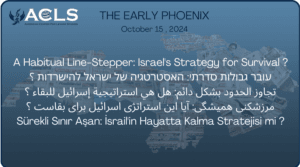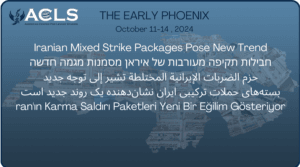
Top Five:
★ B-2 Bombers Target Houthi Weapons Sites in Yemen Strikes
★ U.S. Holds Secret Talks in Baghdad to Deescalate Iran Tensions
★ IAF Strikes Hezbollah Ammunition Depot in Latakia, Syria
★ IDF, Navy Strike Hezbollah Hub in Nabatieh, Kill Mayor
★ Iran Unshaken by Israeli Threats, Confident in Defense Strategy
★ ISRAEL-HEZBOLLAH WAR
30 Rockets Fired from Lebanon Hit Northern Israel
In the latest escalation along the Israel-Lebanon border, approximately 30 rockets were launched from southern Lebanon into northern Israel, specifically targeting the Upper Galilee region. Some of these rockets were intercepted by Israel’s Iron Dome defense system, while others landed in open areas without causing damage. The Israeli Defense Forces responded by deploying countermeasures, including shooting down a drone over the Mediterranean. Meanwhile, reports indicate that the U.S. will not impose an arms embargo on Israel, according to Biden’s humanitarian envoy, who reassured aid groups that military support for Israel remains unwavering despite the ongoing conflict.
Hezbollah Loses Another Underground Facility Hidden Under Residential Buildings
Israel launches airstrikes on Hezbollah targets in Beirut’s Dahiyeh area, ending a five-day pause in attacks. Military sources confirmed the strikes targeted an underground facility containing strategic weapons. The Israel Defense Forces (IDF) took steps to minimize civilian casualties, issuing advanced warnings, including a map in Arabic shared by Lt. Col. Avichay Adraee.
IDF, Navy Strike Hezbollah Hub in Nabatieh, Kill Mayor
The Israeli Navy in cooperation with the IDF targeted the municipal building in Nabatieh, a town in southern Lebanon, killing Mayor Ahmed Kahil and five others. There was underground infrastructure under this building according to the Israeli army. Nabatieh is a strategic city for Hezbollah logistical and operational hub due to its proximity to the Israeli border. It is also a center for Hezbollah’s political and military activities, with strong support from the local population, making it essential for their operations in the region. Watch this video of the strike.
Hezbollah Launches Over 90 Shells Into Northern Israel
In retaliation, Hezbollah launched over 90 projectiles from southern Lebanon into northern Israel on October 16, 2024, according to the Israeli army. The barrage included more than 30 rockets targeting the Western Galilee, while other strikes hit the northern city of Safed. Two Israelis were injured by shrapnel in Majd al-Krum. Israeli forces also intercepted a drone launched over Haifa Bay. Hezbollah claimed responsibility for targeting an Israeli tank near Ramya with a guided missile, resulting in casualties, and attacking Israeli soldiers at Misgav Am with artillery. Israel responded with airstrikes on Aita al-Shaab and other southern Lebanese towns.
Israeli Experts Warn of Hezbollah’s Missile Strength on Channel 12 TV Show
A recent televised discussion on Israel’s Channel 12, highlighted by Al Jazeera, featured Israeli military experts warning about Hezbollah’s recovering missile capabilities. Experts, including Kobi Marom and Amos Yadlin, noted that Hezbollah’s missile arsenal now surpasses that of France and Britain. Despite setbacks, Hezbollah is regaining strength, challenging Israel’s air defenses with advanced missiles and drones. The experts cautioned that Hezbollah aims to draw Israel into a prolonged war of attrition, posing a serious strategic threat.
UNIFIL Reports Israeli Tank Fire on Peacekeepers’ Watchtower in Southern Lebanon
UNIFIL confirmed that an Israeli Merkava tank fired at its watchtower near Kfar Kela in southern Lebanon on Wednesday, damaging the structure and destroying two cameras. UNIFIL spokesperson Andrea Tenenti explained that the peacekeepers are not evacuating despite the escalating conflict, as their presence is based on a UN Security Council mandate. He emphasized the importance of UNIFIL’s role in monitoring the region and providing humanitarian aid to civilians in southern Lebanon. Tenenti also expressed concern over the ongoing Israeli airstrikes, which have resulted in the deaths of civilians and humanitarian workers in recent weeks.
Netanyahu Criticizes Macron and Confirms Russian Weapons Found in Lebanon
Israeli Prime Minister Benjamin Netanyahu criticized French President Emmanuel Macron for what he called a “painful distortion of history” regarding Israel’s founding and an arms embargo. Netanyahu condemned Macron’s call to halt arms imports to Israel, emphasizing that Israel does not import weapons from France while Iran supplies missiles to its proxies. Netanyahu confirmed the discovery of modern Russian-made weapons in Hezbollah’s bunkers in southern Lebanon.
Parents of Hamas Hostages Urge Biden to Challenge Iran Over Captivity
Israeli-American parents of Hamas hostages are calling on President Biden to take a tougher stance on Iran, which backs Hamas. Families expressed frustration with the diplomatic approach, urging direct action to secure the release of seven Americans trapped in Gaza. They emphasized that Biden’s response will define his legacy. Parents like Ronen Neutra and Ruby Chen want the U.S. to confront Iran over its role in supporting Hamas, believing a stronger approach is needed to break the current stalemate. Despite months of diplomatic efforts, families feel time is running out to save their children.
========
★ ISRAEL-HAMAS WAR
Israeli Airstrikes Devastate Gaza’s Jabalia
As the Gaza conflict entered its 377th day, Israeli forces intensified airstrikes on Jabalia in northern Gaza. Dozens of civilians were trapped beneath the rubble, with the Civil Defense unable to retrieve bodies or provide aid. The strikes targeted residential buildings, resulting in heavy casualties. Meanwhile, in the West Bank, Israeli forces continued nightly raids, injuring several Palestinians, including children, in Salfit and Jalazone. As violence escalates, the humanitarian crisis in Gaza deepens, with survivors desperately searching for loved ones in the widespread destruction.
Al-Qassam Claims Israeli Forces Killed in Northern Gaza Explosion
Al-Qassam Brigades claimed responsibility for killing and injuring Israeli forces by detonating a pre-rigged building in northern Gaza. The explosion targeted an Israeli patrol, followed by a second blast aimed at a rescue force near Jabalia. In response, Israeli airstrikes killed at least 50 Palestinians across Gaza. Palestinian officials confirmed 17 deaths near Al-Faluja and 10 more in Bani Suheila from an Israeli missile strike. The conflict continues escalating with significant casualties on both sides.
U.S. Pressures Israel to Increase Gaza Aid, Monitors Compliance
Israel permitted 50 aid trucks to enter northern Gaza following U.S. pressure, which warned that military aid could be affected if humanitarian access did not improve. Washington is monitoring Israeli actions to ensure no “starvation policy” is being enforced. This comes amid intensified Israeli strikes in Lebanon targeting Hezbollah. U.S. officials, including Ambassador Linda Thomas-Greenfield, stressed the importance of maintaining aid channels, warning that obstruction could impact military assistance under U.S. law. Meanwhile, Gaza faces severe shortages, and Israel is under scrutiny to balance military operations with humanitarian considerations.
===========
★ SYRIA
IAF Strikes Hezbollah Ammunition Depot in Latakia, Syria
Israeli aircraft launched a pre-dawn airstrike on Thursday, October 17, 2024, targeting a Hezbollah ammunition depot near a Syrian military barracks in Latakia, Syria. Syrian state media reported that the country’s air defense systems intercepted multiple hostile targets, though significant fires broke out near the entrance to Latakia, causing material damage. The Syrian Observatory for Human Rights confirmed that the strike specifically targeted a Hezbollah missile warehouse, resulting in explosions from the stored weapons. This marks a continued escalation of Israeli operations against Iranian-linked targets in Syria, which have increased since the conflict in Gaza and Lebanon intensified in 2023. No casualties were reported, but the strike highlights ongoing Israeli efforts to prevent Hezbollah and Iran from bolstering their military presence in the region.
===========
★ IRAN
Iran Unshaken by Israeli Threats, Confident in Defense Strategy
Iran’s response to Israeli threats, highlighted in the Tehran Times, projects a calm confidence grounded in its long-standing readiness. Behrouz Kamalvandi, spokesperson for the Atomic Energy Organization, pointed to decades of attempted sabotage against Iran’s nuclear sites, stressing that nothing new can be achieved through further threats. He noted Iran’s preparedness to minimize potential damage, assuring that even if an attack were to happen, the impact would be minimal and easily managed. The spokesperson emphasized Iran’s technological capability and readiness to quickly recover, attributing this resilience to the expertise of Iranian specialists. While Tehran continues to bolster its defenses, the calculated tone and focus on improbability suggest Iran is operating with a degree of assurance about the region’s stability.
Iranian Plot Foiled: Israeli Arrested for Scientist Assassination Attempt
Israeli authorities uncovered an Iranian intelligence network recruiting citizens for security-related tasks. Vladimir Varhovsky from Petah Tikva was arrested for agreeing to assassinate an Israeli scientist for $100,000 and acquiring a weapon. He communicated with Iranian officials via social media, receiving instructions for seemingly harmless tasks like graffiti. The Shin Bet and Israeli police emphasized their commitment to uncovering Iranian threats and punishing anyone involved in such espionage plots.
Iran’s Shah’s Son Condemns Regime’s False Slogans on Palestine
Reza Pahlavi, son of the former Shah of Iran, told Sky News Arabia that the Iranian regime’s claims of supporting Palestine are false. He accused the regime of using Palestinians as human shields to further its own agenda while ignoring the real needs of Iranians. Pahlavi highlighted that Iranians are fed up with the regime’s misuse of billions of dollars to fund militant groups like Hamas and Hezbollah, instead of addressing domestic issues. He called for the overthrow of the regime, emphasizing that true peace and regional cooperation can only happen with a democratic Iran.
Iran’s FM Araghchi Tours Arab Nations, Ready for Conflict
Iranian Foreign Minister Abbas Araghchi is conducting a regional tour to address Israel’s ongoing military actions in Gaza and Lebanon, meeting with his Jordanian counterpart Ayman Safadi in Amman to discuss regional cooperation to prevent further conflict. Abbas emphasized that Iran does not seek war but is fully prepared for any conflict, a message he has shared during visits to Lebanon, Syria, Saudi Arabia, Qatar, Iraq, and Oman. On Wednesday, Abbas arrived in Cairo, marking the first high-level Iranian official visit to Egypt in ten years, signaling improved relations between the two countries. Talks in Egypt focus on coordinating efforts to halt Israeli actions and activate ceasefires in Gaza and Lebanon, with Egyptian Foreign Minister Badr Abdel Aati underscoring Egypt’s role in reducing regional tensions. The Iranian Revolutionary Guard also reiterated its readiness to support its regional allies in their conflict with Israel.
Australia Sanctions Iran Over Strikes On Israel
Australia has imposed financial sanctions and travel bans on individuals linked to Iran’s missile program, following Tehran’s missile attacks on Israel two weeks ago. The Australian government’s sanctions, announced Tuesday, target senior officials from Iran’s Aerospace Industries Organization, the head of the Shahid Bagheri Industrial Group, and the commercial director of the Shahid Hemmat Industrial Group.
Iran Struggles to Contain Oil Spill, Raising Pollution Concerns
Iranian authorities are working to control an oil spill approximately six kilometers off Kharg Island, according to the IRNA news agency. A local official reported that the spill from oil pipelines was discovered on Sunday, prompting necessary actions. Drones have identified two additional spill spots, and measures have been activated to prevent further pollution spread. The situation is under continuous assessment.
U.S. Experts Foresee A Grim Future For Iran’s Regime
Russell Burman and Marshall Billingsley predict severe consequences for Iran if U.S. policy shifts toward stronger sanctions and military actions. They warn of crippling sanctions on Iran’s oil exports and a renewed focus on dismantling its terror networks, including Hezbollah and Hamas. Discover their full insights in ACLS’s Foreign Policy Perspectives-Guiding Tomorrow.
========
★ YEMEN
B-2 Bombers Strike Houthi Weapons Storage Sites in Precision Strikes
CENTCOM confirmed airstrikes on five underground Houthi weapons storage sites in Yemen using B-2 Spirit stealth bombers, which took off from Whiteman Air Force Base in Missouri. These strikes marked the first combat mission for the B-2 bombers in the Middle East conflict and the first in combat operations in many years. Defense Secretary Lloyd Austin stated the operation aimed to degrade the Houthis’ ability to attack vessels, signaling a significant escalation rather than just a message to Tehran. No civilian casualties were reported. Yemeni sources revealed Houthi leader Abdul-Malik al-Houthi ordered commanders to downplay their capabilities and relocate weapons, anticipating an Israeli attack. The Houthis are reinforcing positions while coordinating with Iran for potential escalations.
========
★ IRAQ
U.S. Delegation in Baghdad for Secret Iran Negotiations
A U.S. delegation arrived secretly in Baghdad on October 16, 2024, to prepare for indirect talks with Iran. According to a political source, the U.S. seeks broad negotiations covering regional security issues, while Iran prefers to address them separately. The U.S. aims to de-escalate tensions and avoid war with Iran, especially as election season approaches and regional allies express concerns over risks to vital oil and gas infrastructure. Baghdad is playing a critical role in mediating these talks, with Gulf states supporting Washington’s efforts to prevent further instability in the region.
Iraqi Fighters Conduct Drone Strike on Vital Israeli Target
Iraqi resistance groups carried out a drone strike on a significant target in Israeli-occupied territories in retaliation for Israeli actions against Palestinians in Gaza and the Lebanese people.
=========
★ GULF NATIONS
Arab Leaders Push for Peace Talks at EU-Gulf Summit
At the EU-Gulf summit in Brussels, Arab leaders, including Saudi Crown Prince Mohammed bin Salman, called for urgent peace talks to prevent a broader Middle East conflict amid the escalating violence in Gaza and Lebanon. The Gulf Cooperation Council (GCC) Secretary-General stressed the severe impact of the Gaza conflict on regional stability and Red Sea shipping routes, calling for restraint and a ceasefire. European leaders, including Ursula von der Leyen and Josep Borrell, joined Gulf officials in discussing economic ties, energy, and climate, despite differences over global issues like Ukraine. Saudi Arabia and Qatar were praised for their diplomatic efforts to mediate the Gaza crisis, working closely with international partners to de-escalate tensions. The GCC reaffirmed its support for the Saudi-led two-state solution initiative, seeking stability through diplomatic engagement with Arab, Islamic, and European allies.
============
★ EGYPT
Sisi Appoints Hassan Mahmoud Rashad as New Intelligence Chief
Egyptian President Abdel Fattah el-Sisi appointed Hassan Mahmoud Rashad as the new head of the General Intelligence Service on Wednesday. Rashad, a graduate of the Military Technical College, had risen through the ranks to become deputy chief before taking the oath as head of the intelligence agency. His predecessor, Major General Abbas Kamel, was appointed as an advisor to the president and general coordinator of the security services. Kamel will also serve as the president’s special envoy.
Egypt Expands Water Deals with Somalia, Kenya, and Nigeria
Egypt signed new water management agreements with Somalia, Kenya, and Nigeria during the seventh Cairo Water Week, which concluded Wednesday. The deals aim to enhance cooperation on water resource management and address challenges like water scarcity and climate change. Egypt’s Ministry of Water Resources and Irrigation collaborated with international and regional organizations to strengthen its role in African water diplomacy. Former diplomats and experts see these agreements as crucial for fostering stronger partnerships with African nations and tackling shared environmental challenges. The event also marked the ninth African Water Week.
=========
★ TURKIYE
26. Turkiye Expands Defense Cooperation with Saudi Arabia Through KAAN Fighter Jet Deal
Turkiye is enhancing defense ties with Saudi Arabia through discussions to sell over 100 KAAN fifth-generation stealth fighter jets, developed by Turkish Aerospace Industries (TUSAS). During a recent visit, Saudi Air Force Commander Turki bin Bandar Al Saud met with Turkish officials, exploring KAAN’s capabilities and the potential for technology transfer and local production. This deal, viewed as an alternative to U.S. F-35s, underscores Turkey’s expanding influence in global defense and its growing role as a major defense technology provider in the region.
========



